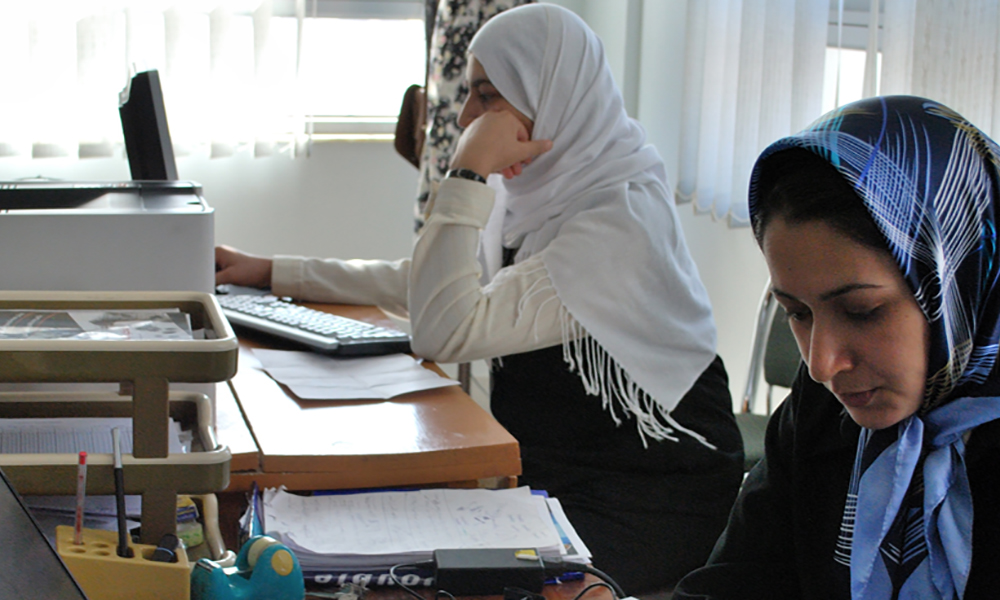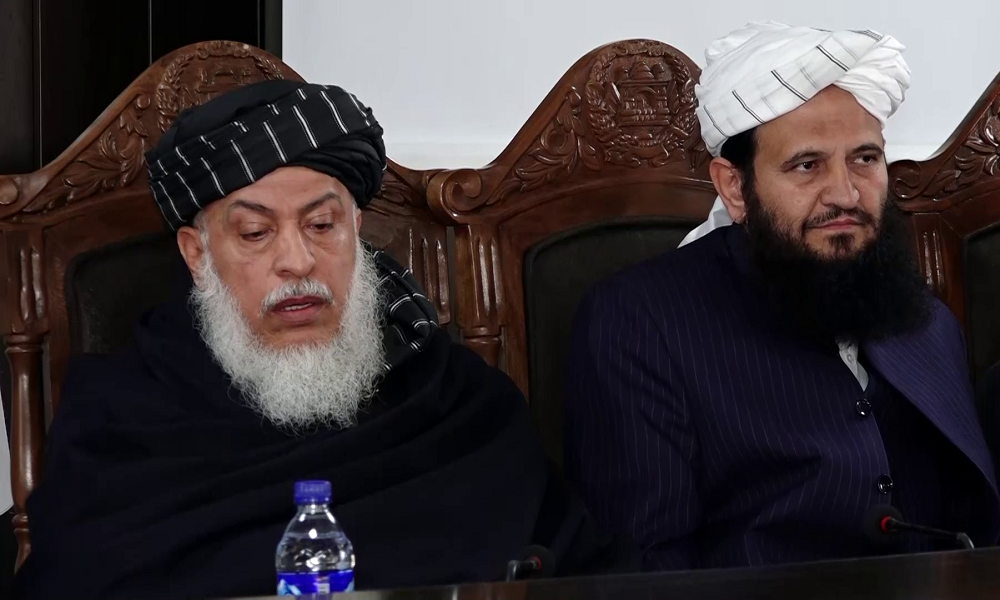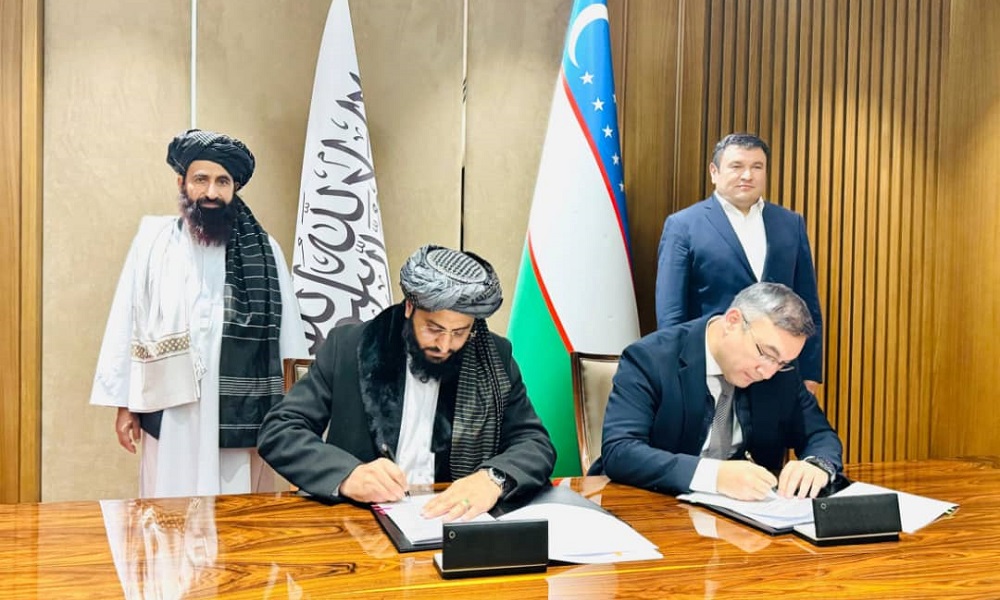Latest News
Afghanistan: Humanitarians await guidelines on women’s role in aid operations

A UN-led group of humanitarians are hoping that the Islamic Emirate of Afghanistan (IEA) will allow Afghan women to again work with non-governmental organizations (NGOs) on the ground following last month’s ban, four senior aid officials told journalists in New York on Monday.
In a statement issued by the UN, the group, representing the Inter-Agency Standing Committee (IASC), stressed that the world’s largest humanitarian operation – supporting some 28 million people in Afghanistan – simply cannot function without women staff.
The officials reported on their mission to the country last week, in the wake of the edict prohibiting Afghan women from working with local and international aid agencies, announced on 24 December.
Days later, the IEA authorized women to continue working in healthcare.
A similar exception was made in education, though focused on the primary level as Afghan girls and women have been barred from attending high school and university.
In their meetings with the IEA, the IASC mission expressed opposition to the ban, which they hoped would be rescinded, and advocated for exemptions in all aspects of humanitarian action.
They were told that guidelines are being developed, and were asked to be patient, said Martin Griffiths, UN relief chief and the IASC chair, speaking during a press conference at UN Headquarters.
“I’m somebody who doesn’t like to speculate too much, because it is a matter of speculation. Let’s see if these guidelines do come through. Let’s see if they are beneficial. Let’s see what space there is for the essential and central role of women in our humanitarian operations,” he said.
“Everybody has opinions as to whether it’s going to work or not. Our view is that the message has clearly been delivered: that women are central, essential workers in the humanitarian sector, in addition to having rights, and we need to see them back to work.”
The UN says humanitarians will require $4.6 billion to fund their activities in Afghanistan this year.
Three years of drought-like conditions, economic decline, and the impacts of four decades of conflict, have left roughly two-thirds of the population, 28 million people, dependent on aid, with six million on the brink of starvation.
Women comprise 30 percent of the 55,000 Afghan nationals working for NGOs in the country, according to Janti Soeripto, President and Chief Executive Officer of Save the Children.
“Without women on our teams, we cannot provide humanitarian services to millions of children and women,” she said.
“We won't be able to identify their needs; communicate to female heads of households, of which there are many in Afghanistan after years and years of conflict, and to do so in a safe and culturally appropriate way.”
The UN stated that furthermore, many women aid workers are themselves the sole breadwinners for their families, which means many more households will go wanting.
“We've made it very clear that humanitarian aid must never be conditional, and it cannot discriminate,” said Soeripto. “We were not there to politicize aid. We cannot do this work without women in all aspects of our value chains.”
The loss of these valuable workers also comes as Afghanistan is facing its coldest winter in 15 years, with temperatures falling to nearly -30 degrees Celsius, resulting in numerous deaths.
The IASC mission visited a clinic on the outskirts of the capital, Kabul, run by the UN Children’s Fund (UNICEF) and a local partner.
Critical health and nutrition services there are up and running again now that women staff are back on board, said Sofía Sprechmann Sineiro, Secretary General of CARE International.
The clinic’s staff also shared a horrific statistic, as 15 percent of the children who seek help suffer from severe acute malnutrition, the UN stated.
“So, let there be no ambiguity. Tying the hands of NGOs by barring women from giving life-saving support to other women will cost lives,” Sineiro said, speaking from Kabul.
According to the statement, during their meetings with the IEA, the humanitarian chiefs also pushed for the full inclusion of girls and women in public life.
More than one million Afghan girls have lost out on learning due to the order banning them from secondary school, which has added to losses sustained during the COVID-19 pandemic.
The university ban, announced last month, has further crushed their hopes, said Omar Abdi, UNICEF Deputy Executive Director for Programmes.
“We are very concerned about girls’ and women's development and particularly their mental health. In 2023, if secondary school education remains closed, an estimated 215,000 girls who attended grade six last year will once again be denied the right to learn,” he said.
Despite the bleak outlook, Abdi pointed to a few positive signs.
Since the ban, some 200,000 girls continue to attend secondary schools in 12 provinces, and women secondary school teachers continue to receive their salaries.
“The officials we met in Kabul…reaffirmed that they are not against girls learning in secondary schools, and again promised to re-open once the guidelines are approved by their leader,” he said.
Meanwhile, the number of community-based education classes in private homes and other locations has doubled to 20,000 over the past year, serving some 600,000 children, more than half of them girls.
“These positive signs are the results of both the commitment from the de facto authorities (IEA) and pressure from local communities to keep schools and community schools open,” said Abdi.
“As long as communities continue to demand education, we must continue to support both public and other forms of education, community-based classrooms, catch-up classes and vocational training.”
Latest News
There should be no distance between media and government: Stanikzai

Sher Mohammad Abbas Stanikzai, the political deputy minister of foreign affairs, says media outlets should be supported in a way that there is no distance between them and the government.
Stanikzai, speaking at a seminar titled "The Role of Media in Strengthening the Islamic System" in Kabul, added that the media plays a crucial role in global propaganda wars, and it is necessary for the IEA to cease exerting pressure on the country's media and allow them to freely play their role in the development and prosperity of the country.
"The problems of the media should be heard, their voices should be heard, and the environment should be conducive for them to carry out their work freely,” he stated.
He further emphasized that the views towards the country's media should be such that both sides do not view each other as strangers, and the IEA should refrain from exerting pressure on the media and allow them to operate with freedom.
Meanwhile, officials from the Ministry of Information and Culture also stated at the seminar that they have not adopted an approach of confrontation with the media and that the ministry is committed to collaborating with them.
Participants in the seminar also urged the media to spare no effort in reflecting a positive image of Afghanistan to the world.
This seminar was held at a time the media considers itself committed to freedom of expression and reporting activities within the framework of national interests and Islamic values.
Latest News
DABS signs contract to purchase electricity from Uzbekistan for 2025

Da Afghanistan Breshna Sherkat (DABS) has announced that a contract for the purchase of electricity from Uzbekistan has been signed for the year 2025.
This agreement was signed following a visit by an Islamic Emirate delegation, led by DABS CEO Abdul Bari Omari to Tashkent, where they engaged in discussions with Uzbek officials.
"The General Director of Da Afghanistan Breshna Sherkat, along with a delegation, traveled to Uzbekistan and signed the electricity purchase agreement for 2025 during a meeting with officials from the Uzbek electricity sector,” said DABS spokesman Hekmatullah Maiwandi.
Meanwhile, some investors have urged IEA to engage with Uzbekistan regarding the 500-kilovolt electricity project and to ensure the swift completion of this project.
Once completed, the project is expected to alleviate some of the electricity shortages in the country.
Tajikistan agreement
Late last month, Tajikistan's national electric power company, Barqi Tojik, and DABS signed a similar agreement, which will see Tajikistan supply Afghanistan with power through 2025.
The signing ceremony was attended by Mahmadumar Asozoda, General Director of Barqi Tojik, Omar.
According to Barqi Tojik's press secretary, Kurbon Ahmadzoda, the agreement is expected to be extended annually until 2028.
However, the electricity export will reportedly be limited to the summer months, from May to September, and will be dependent on the availability of electricity within Tajikistan's domestic market, Tajik media reported at the time.
Powering a future
Afghanistan currently produces only 20% of its energy needs, while 80% of its electricity is imported from Uzbekistan, Tajikistan, Turkmenistan, and Iran.
The Islamic Emirate has however made it a priority to encourage domestic production of power since regaining control in August 2021.
Omar has met with potential investors on numerous occasions and has encouraged them to invest in the sector.
One such meeting was held in August with officials from Bayat Power.
Bayat Power is Afghanistan’s largest private Electric Power Production and Development Company and owns and operates Bayat Power-1, the first in a new generation of Gas to Electricity power generation plants.
Bayat Power is hoping to start work soon on Phase 2 of Bayat Power-1 in northern Jawzjan province in order to increase electricity production output for Afghanistan.
Mohammad Shoaib Sahibzada, the technical head of Bayat Power, has said that once Phase 2 is complete, electricity production will increase from 40 to 100 megawatts.
Sahibzada said Bayat Power's natural gas to electricity generation project will eventually produce up to 250 megawatts of electricity once Phase 3 is complete.
Bayat Power has produced over one billion kilowatt hours of electricity in just under five years after starting commercial operations in late 2019.
Sahibzada said that over the past five years, the company has also worked on capacity building of its technical employees.
Leading the way
Bayat Power is the first private company in 40 years to produce electricity from natural gas in the country and the multi-million dollar plant uses Siemens Energy’s SGT-A45 mobile gas turbine for its economic efficiency, flexible deployment, and power density.
Currently providing electricity to hundreds of thousands of end-users and generating more than 300 million kWh annually, the project was structured as an innovative public-private partnership between Bayat Power, Siemens Energy, and Afghanistan government entities such as the
Ministry of Mines and Petroleum, the Ministry of Energy and Water, and the General Directorate of Afghan Gas Corporation Company, Da Afghanistan Breshna Sherkat (DABS), and international partners.
The Bayat Group is the largest private investor in Afghanistan and Bayat Power is currently the only gas-powered plant in the country.
The Siemens Energy’s SGT-A45 mobile gas turbine used by the company is the only one in operation in the world.
Latest News
ATN’s hat-trick! Rights in place to broadcast ICC World Test Championship 2023/25 Final

Ariana Television and Radio Network (ATN) has done it again! This time it secured the rights to broadcast the ICC World Test Championship 2023/25 Final in Afghanistan.
The 2023–2025 ICC World Test Championship is an ongoing tournament of Test Cricket which is the third edition of the ICC World Test Championship.
This event started in June 2023 with The Ashes, which was contested between England and Australia. It will finish in June 2025 with the final match planned to be played at Lord's in London.
The tournament consists of 27 series and 69 matches in the league stage between nine countries. The top two teams in the points table will compete at the final.
Current State of Play
A draw this week in the third Test between Australia and India has spiced up the race to the World Test Championship Final especially as Australia and India continue to play catch-up with South Africa after the rain-truncated third Test in Brisbane ended in a stalemate.
South Africa had to dig deep against Sri Lanka recently, but a standout all-round performance helped them secure a series win and pushed them to the top of the standings, placing them as the front-runners for the WTC25 Final at Lord’s.
Alongside South Africa, Australia and India, Sri Lanka remains the only other team in contention for a WTC25 Final spot. However, they will need a string of favorable results - including a successful showing in their upcoming two-match series against Australia in January - to keep their hopes alive.
South Africa is top of the standings with a PCT of 63.33. They need to win one out of their two upcoming tests against Pakistan to reach their maiden ICC WTC final.
Australia and India are in second and third place respectively.
India has a PCT of 55.88 and two tests left, both of which they need to win to secure a place in the final.
Australia’s PCT is 58.89. After two tests against India. They have two more tests in Sri Lanka.
For cricket fans across the country, make sure you follow us on social media, and watch this spot, for updates and announcements on this event - along with other exciting tournaments coming up next year that Ariana Television will be bringing to you live and exclusively in Afghanistan.
-

 Latest News4 days ago
Latest News4 days agoAfghanistan seals T20I series victory over Zimbabwe
-

 World5 days ago
World5 days agoSyrian clerics in former Assad stronghold call for national unity, democracy
-

 Latest News4 days ago
Latest News4 days agoU.S. sentences Afghan man to 30 years in prison for narco-terrorism and witness tampering
-

 International Sports3 days ago
International Sports3 days agoMessi vs Ronaldo: A look at their market values over the years
-

 Latest News4 days ago
Latest News4 days agoInvestment in Afghanistan’s pharmaceutical sector reaches $300 million: Union
-

 Latest News5 days ago
Latest News5 days agoChinese, Tajik officials discuss Afghanistan
-

 Sport4 days ago
Sport4 days agoAfghanistan’s Gulbaddin Naib fined 15% of match fee for dissent
-

 Regional4 days ago
Regional4 days agoHezbollah chief says group lost its supply route through Syria
























